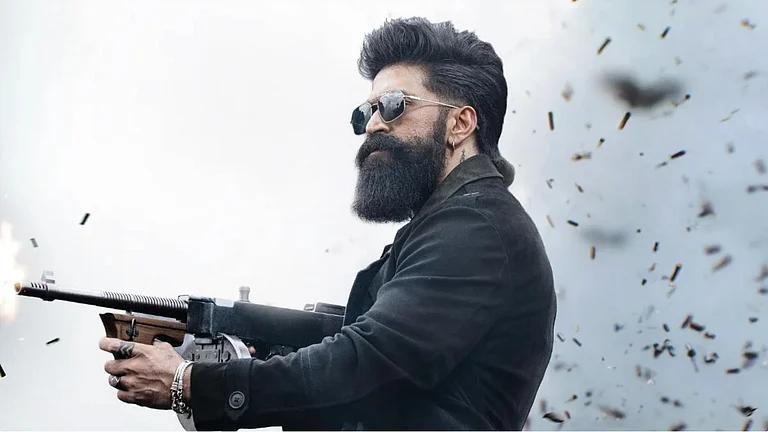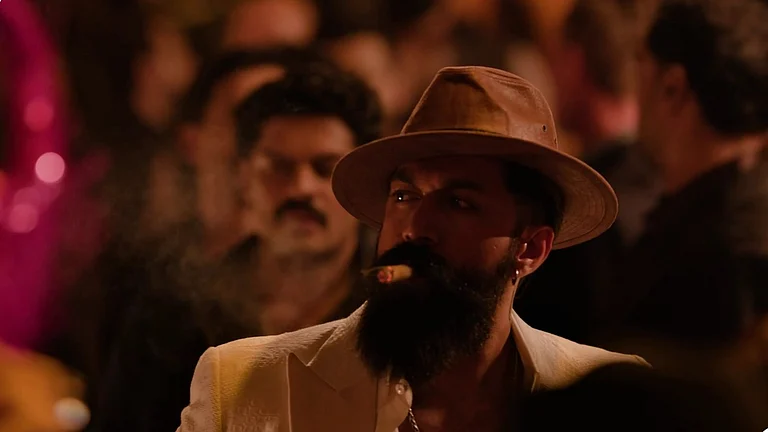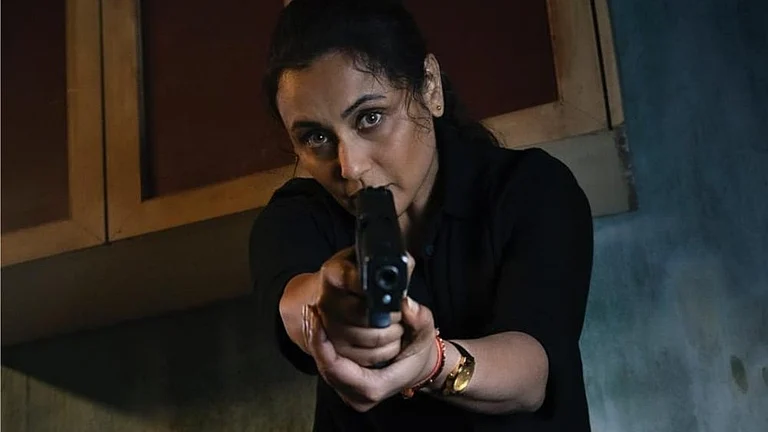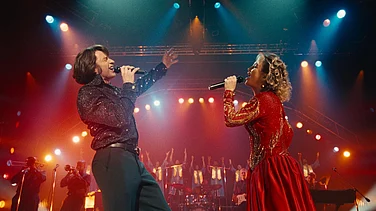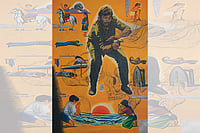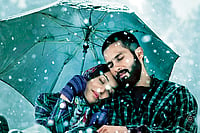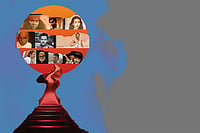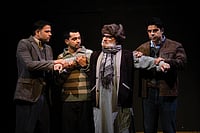There is such a thing as the ‘Salim-Javed moment’. No, I’m not referring to memorable dialogues and scenes from their films. I’m talking about a sense of recognition that defines and magnifies their identities in ways that astound us. A Salim-Javed moment is a near-impossibility—an out of syllabus question. It underscores their ingenuity, yes, but also tells us something about our cinema culture, our latent possibilities, our subconscious lessons. Still confused? Let me answer this question with another question: What links Salim-Javed to Quentin Tarantino—or Deewar (1975) to Reservoir Dogs (1992)?
In the mid-’80s, a group of Hong Kong action movies—replacing the traditional kung fu weapons with guns and explosives—heralded a new genre in the country’s cinema called “heroic bloodshed”. Its key proponents included directors John Woo and Ringo Lam. The genre’s first film, Woo’s A Better Tomorrow (1986), was partly inspired from a 1979 drama, The Brothers, which was a remake of… Deewar. Benefitting from A Better Tomorrow’s success, Lam directed City on Fire (1987), a famous heroic bloodshed drama, which Tarantino liked so much that he borrowed vital elements from it to make Reservoir Dogs. So, in essence, Deewar -> The Brothers -> A Better Tomorrow ----heroic bloodshed genre---->City on Fire -> Reservoir Dogs.
This, my friends, is a Salim-Javed moment.

And not even my first. That came when I found out that they had painted their names on the posters of Zanjeer (1973). Hollywood screenwriters protested the industry’s exploitative practices in a months-long strike last year. The OG cool cats, Salim-Javed, painted their dissent five decades ago. And this week, I had my third Salim-Javed moment while watching a (long-due) documentary on them, Angry Young Men. At one point in the third episode, we see a clip from the duo’s Haath Ki Safai (1974), where Vinod Khanna catches Randhir Kapoor stealing his wallet and says, “Bache, tum jis school mein padhte ho, hum uske headmaster reh chuke hain.” Even without watching this film, I’ve been using this line since my childhood—for decades—unaware of its origin. Classic Salim-Javed: They had sauntered into my life when I just began to live it.
Directed by Namrata Rao—whose editing oeuvre in the late aughts and 2010s, much like Renu Saluja’s in the ’80s, encapsulates a mini-film movement in Bollywood—Angry Young Men starts on a pleasant note. Here we meet a young, dapper man, Salim, wanting to be an actor. The documentary indeed frames him (and Javed Akhtar) like heroes: confident, clean-shaven, charming, flashing conspiratorial smiles from the black-and-white photographs. It functions as an in-joke: In a star-worshipping industry, two writers are presented as stars. The pages from their screenplays rustle on screen, almost implying that, in the universe of Salim-Javed, the directors just executed their visions.
Angry Young Men uses many clips from their movies—imbuing it with a delectable flavour of old Bollywood—which also illustrates deft editing (by Geeta Singh). Quite early in the first episode, we see rapid scenes comprising iconic dialogues from Salim-Javed films by fans and actors. Ranveer Singh reeling off a line from Deewar—Aaj mere paas building hai, property hai ... tumhare paas kya hai?—cuts to AR Rahman saying “mere paas maa hai” on the Oscars stage in 2009. This one transition distils the writers’ essence: yatra, tatra, sarvatra—here, there, everywhere.
In a culture, which barely cares for preserving its own heritage (cinematic or otherwise), it’s important that a documentary—or a document—like this exists. More so because it tells a decades-old story whose protagonists may not be around for long. Consider this film itself: The hands of Akhtar and Helen, 79 and 85, shake with such intensity that, at times, I wanted to look away. Wrinkles inundate the wrists of octogenarian Salim. Their lives hold crucial keys and clues to the myths and mechanics of Bollywood—a film industry coursing in our veins, defining our meanings of aspiration, triumph, love, life itself.

Yet a paradox tails Angry Young Men: access. That’s the bare-minimum you need to make a piece like this: access to the principal and ancillary talking heads, access to the movie clips (controlled by stringent copyright laws), access to funds. But considering the frail egos of many Bollywood celebrities, chances are high a filmmaker wouldn’t get any kind of access if she wants to make a penetrating (yet fair) documentary on their lives. Even beyond the people and clips, though, it’s the access to money that matters the most.
Consider the two most notable movies in this genre: a documentary on Yash Raj Films produced by Yash Raj Films, The Romantics (2023), where I must mention, in the spirit of full disclosure, that I appeared as a talking head) and a documentary on Salim-Javed presented and produced by their children, Salman Khan, Farhan Akhtar, and Zoya Akhtar. Much in the same way you don’t bite the hand that feeds—you also don’t film the flaws that you see. Or, at the very least, you find a way to soften the blows: to ensure that the celebrities, and not the cinephiles, have the last word.
There’s nothing wrong with the format. Even here, some people, such as Jaya Bachchan and Honey Irani (Akhtar’s ex-wife), do reveal significant, precise details about the writers: that how they loved praising themselves, that how success had gone to their heads, that how they had turned arrogant—factors that may have precipitated their downfall. But besides these exceptions, most celebrities talk in banal generalities, including—and especially—Amitabh Bachchan, the angry young man. It’s legit baffling, as the actor and the writers shared a fascinating relationship, reminding you of the chicken-or-the-egg question: Who made whom? Could Bachchan have become a star without Salim-Javed? Could Salim-Javed have become as big without Bachchan? But let alone saying anything revealing, the actor looks borderline disinterested. Even the veteran journalists, such as Bhawana Somaaya, Bharathi Pradhan, and Anupama Chopra, largely provide facts, not insights.
At one point in the third episode, Angry Young Men sharpens its claws. After Kareena Kapoor Khan has spoken about how the duo wrote “strong female characters”, a series of movie clips endorse that point. It cuts to screenwriter Anjum Rajabali saying the actresses had “promising backgrounds”, but “the moment” they entered the “hero’s plot”, they became “inconsequential”. He gives an example: Hema Malini in Trishul (1978), the CEO of a construction company, which means she’s “absolutely in business”. But “what does she do” instead? He whistles: “She sings some wonderful songs.”
The documentary cuts to Reema Kagti and Zoya Akhtar. It was the “time they were writing in,” says Kagti (an argument we’ve only heard 10,000 times before), then cites Seeta Aur Geeta (1972). “All their women were strong characters,” adds Zoya. “They all had agency.” The documentary changes track, and we see a scene from Dostana (1980). But what should have really followed was a clip from Sholay (1975), where Veeru (Dharmendra), in the guise of ‘teaching’ Basanti (Hema Malini) how to fire a gun, keeps touching her, much to her initial confusion. It’s a complicated scene, where a woman’s discomfort is first played for laughs (as Jai says, “Maine toh aankh pehle hi band kar rakhi hai”) but ends with her berating Veeru. How tough was it for this documentary to imply that, regarding female characters, Salim-Javed’s oeuvre tells a more complex story? But no, it must contrive a disingenuous endorsement-criticism-endorsement sequence to squash our doubts.
Then there’s the question of writers in Bollywood. Here, too, we get some remarkable, revealing quotes (and not in the way the talking heads intended). First, Karan Johar, a powerful producer, remembers how in Dharma Productions’ first film, Dostana, Salim-Javed demanded a lakh more than Bachchan. “Can you imagine today if a writer said, ‘I want a crore more than Salman Khan?’” He smiles in disbelief: “It’s unheard of.” (Why is it “unheard of”, I wonder, do producers have some part to play in it?)
Aamir Khan, who clashed with Amol Gupte over the director’s credit for Taare Zameen Par (2007), puts his own spin on it: “If you’re saying a writer should be the highest paid in the project, then that should happen and that’s possible. But for that, they’d have to be as big as Salim-Javed.” It’s a typical Aamir Khan response who, once responding to the underpayment of actresses, had said that an actor gets paid according to their “ability to fill the theatres”. His argument wasn’t just logically flawed—many successful actresses don’t earn close to their (mediocre) male counterparts—but also glosses over the darkness in the heart of Bollywood: that the stars and producers have ensured that the screenwriters languish at the bottom of this ‘caste system’. Take Zanjeer (1973), for instance, where the director, Prakash Mehra, backed Salim-Javed even after several stars rejected the script. Mehra was a rare breed—a director who knew that, in a film, the real star is the story itself.
To call Angry Young Men a missed opportunity is a colossal understatement. Forget any shred of interrogation, the documentary doesn’t even examine the minds of Bollywood’s finest screenwriters. There’s hardly any insight into how the two collaborated, how Salim conceived his stories, how Akhtar wrote his razor-sharp dialogues, and so on. Did they disagree—when, where, how? No idea. Did they run into stumbling blocks—when, where, how? No idea. What, according to them, is a perfect screenplay? Why has Bollywood lacked the Salim-Javed touch for decades? What made them split? And why was their split so bitter that, even decades later in a documentary on their lives, they don’t even occupy the same frame (except for a photo shoot at the end)? Why should I bother to watch this and not one of the many vapid, bland interviews clogging my social media feed, where the journalists and the celebrities are in perfect sync with each other, all agreeable, all smiling, all #GoodVibesOnly? Or, to paraphrase a much beloved line by another great writer, Gulzar, Is PR ko PR hi rehne do, ise koi naam na do.
As if waking up from a stupor, the documentary does try to glean some insights from Salim-Javed about the making of a writer, but it’s way too little, way too late. Angry Young Men also feels sloppily structured, with random segues into their personal lives that takes it to a point of no return. Because making a hagiography is one thing; making a hagiographic home video quite the other. Or, more simply, this film has a narrative, but it lacks a story—a soul. This movie also points to a particular moment in our influencer-driven pop culture, where we’ve put celebrities on a pedestal so high—via puff pieces, podcasts, and ‘interviews’—that we can do nothing but crane our necks to admire them. And given this trend has begun to mark the self-congratulatory documentaries, tripping on ‘nostalgia’, we’ll get more of these: thumbs-up for the stars, thenga for the audiences.








